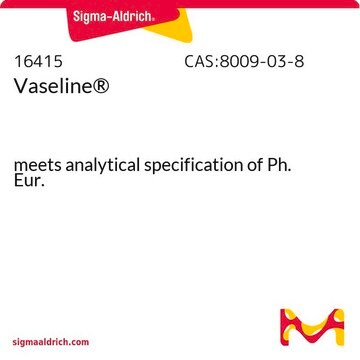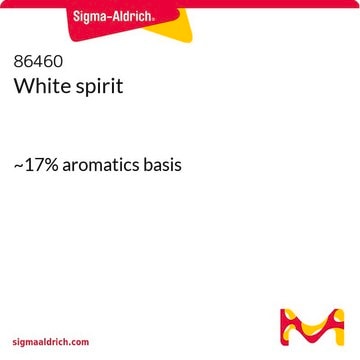M0757
Isopropyl myristate
≥90% (GC)
Synonym(s):
Isopropyl tetradecanoate, Myristic acid isopropyl ester
About This Item
Recommended Products
biological source
synthetic (organic)
Quality Level
Assay
≥90% (GC)
form
liquid
refractive index
n20/D 1.434 (lit.)
bp
193 °C/20 mmHg (lit.)
mp
~3 °C (lit.)
density
0.85 g/mL at 25 °C (lit.)
functional group
ester
lipid type
saturated FAs
shipped in
ambient
storage temp.
2-8°C
SMILES string
CCCCCCCCCCCCCC(=O)OC(C)C
InChI
1S/C17H34O2/c1-4-5-6-7-8-9-10-11-12-13-14-15-17(18)19-16(2)3/h16H,4-15H2,1-3H3
InChI key
AXISYYRBXTVTFY-UHFFFAOYSA-N
Looking for similar products? Visit Product Comparison Guide
Application
- Formulation design and development of matrix diffusion controlled transdermal drug delivery of glimepiride.: This study discusses the design of a transdermal drug delivery system for glimepiride, utilizing matrix diffusion mechanisms potentially incorporating Isopropyl Myristate to enhance permeation (Akram et al., 2018).
- Investigation of microemulsion and microemulsion gel formulations for dermal delivery of clotrimazole.: This article evaluates formulations incorporating Isopropyl Myristate for enhanced dermal delivery of clotrimazole, highlighting its role in improving drug solubility and skin absorption rates (Zhang and Michniak-Kohn, 2018).
Biochem/physiol Actions
Storage Class Code
10 - Combustible liquids
WGK
awg
Flash Point(F)
>302.0 °F
Flash Point(C)
> 150 °C
Personal Protective Equipment
Certificates of Analysis (COA)
Search for Certificates of Analysis (COA) by entering the products Lot/Batch Number. Lot and Batch Numbers can be found on a product’s label following the words ‘Lot’ or ‘Batch’.
Already Own This Product?
Find documentation for the products that you have recently purchased in the Document Library.
Customers Also Viewed
Our team of scientists has experience in all areas of research including Life Science, Material Science, Chemical Synthesis, Chromatography, Analytical and many others.
Contact Technical Service










